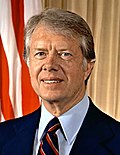Executive Order 12036 created new oversight committees and offered many new restrictions on the U.S. Intelligence Community. The EO set-up the duties and requirements of two National Security Council cabinet-level committees that had been previously created by Carter in 1977. The Policy Review Committee was given the responsibility of defining priorities for intelligence collection and analysis. The Policy Review committee which was chaired by the Director of Central Intelligence (DCI) and also included the Vice President, National Security Advisor, Secretary of State, Secretary of Defense and Chairman of the Joint Chiefs of Staff would also prioritize intelligence community budget allocations. [1] [2]
The EO replaced Gerald Ford's (EO 11905) Operations Advisory Group and replaced it with the Special Coordination Committee which was much like the Policy Review Committee. The EO also imposed a lengthy list of restrictions on the U.S. Intelligence Community to ensure "full compliance with the laws of the United States." One of the main restrictions was that no intelligence operation would be undertaken against a U.S. citizen "unless the President has authorized the type of activity involved and the Attorney General has both approved the particular activity and determined that there is probable cause to believe that the United States person is an agent of a foreign power." This included banning any Central Intelligence Agency electronic surveillance in the U.S. and leaving the Federal Bureau of Investigation as the only intelligence community member allowed to conduct physical searches within the U.S. [1] [2]
The EO also created the National Foreign Intelligence Board (NFIB) in order to assist the DCI with "Production, review, and coordination of national foreign intelligence." The NFIB was chaired by the DCI and included representatives from every agency in the intelligence community. The DCI and agency heads were also expected to keep various congressional committees up to date with intelligence community activity. [1] [2]
The order expanded the ban on assassination in Ford's order to cover all assassination, whether or not "political." [1] [2] This ban on assassination would be restated in Executive Order 12333. [3]
This page is based on this
Wikipedia article Text is available under the
CC BY-SA 4.0 license; additional terms may apply.
Images, videos and audio are available under their respective licenses.


